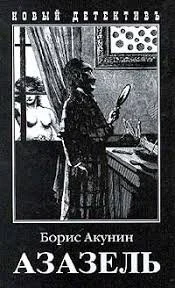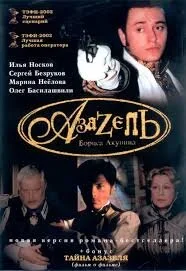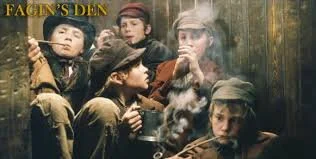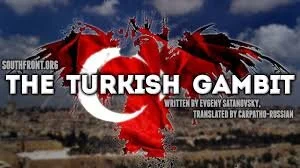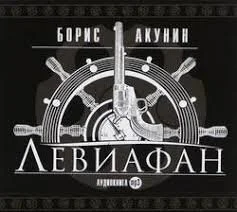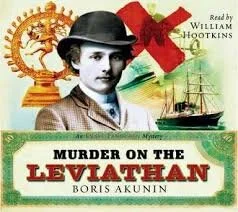
Rereading Akunin
About the Project
I started this one on a whim, and that’s also how I ended it. I’m a big fan of the series re-reads and re-watches that are common on fantasy and science fiction sites; why not do something similar with a popular Russian series? So I started my usual pattern of synoptic reading (starting every different series of books Akunin wrote at the same time, and reading a bit every day). To be blunt, after a while I decided this was not the best use of my time, and I stopped. But I hope that the part that I did complete might be of value to readers of Akunin who might happen to find it.
Note: unlike other pages on this site, Rereading Akunin is posted her in chronological, rather than reverse chronological order. So you can start at the top and work your way down.
Why reread Boris Akunin? For that matter, why read him in the first place? And, for God’s sake, why blog about it?
All the Russias, January 17, 2019
First installments in long-running series are a funny thing. I don’t know what approach to the problem is better: literary theory or set theory. Because the first entry inaugurates a group to which it can never truly belong.
All the Russias, January 22, 2019
“The Adventures of Erast Fandorin” are very much of their time—or rather, times, since the action takes place in the last part of the nineteenth century while the books’ publication begins on the cusp of the twentieth and twenty-first. Akunin’s is not just giving the nineteenth century a backward’s glance; it’s a full-fledged staring contest between the ages, with readers waiting to see who will blink first.
All the Russias, January 29, 2019
In a roundabout fashion, The Winter Queen reminds me of the opening section of Andrei Platonov’s unwieldy masterpiece Chevengur (that’s the Russian title—the English title is Chevengur).
All the Russias, February 8, 2019
In this short but eventful chapter, Erast Petrovich Fandorin takes a trip to the Crimea. No, not that Crimea (it’s not ours).
All the Russias, February 12, 2019
Is there anything more tedious than historical parallels, especially in Russia? And if it really is those who forget the past that are doomed to repeat it, then shouldn’t Russians, who can’t stop talking about history, be constantly forging a new path? The country has been so obsessed with history and commemoration that Russia would be justified in abandoning plausible historical events in favor of unlikely plot twists, to the point that Russian history starts looking like the last season of Lost, or any show run by Ryan Murphy.
All the Russias, February 19, 2019
Erast Fandorin dropping by an orphanage is a bit like Yogi Bear seeing his ursine cousins at the zoo: the visitor and the visited belong to the same species, yet the contrast between the institutionally confined and the free-range specimens is vast.
All the Russias, February 27, 2019
The only plot point that screams “Russian literary classic” as loud as a duel is watching a nest of gentry throwing their lives away in a game of cards. Both are useful devices for portraying a conflict that is simultaneously a clash of wills and a game of chance, while keeping physical action to a minimum. Life-and-death struggles rarely get more elegant than this.
All the Russias, March 6, 2019
Cooking the Raw Youth
A very long night, indeed. Where most of the previous chapters were lucky if they could claim to contain one significant plot twist, Chapter Eleven sees a parade of odd characters traipse their way through Fandorin’s newly rented room.
All the Russias, March 20, 2019
I’ve been saving this title for a while, and, truth be told, I really should have saved it for later. After all, it only takes a year or two of writing Erast Petrovich’s adventures for Akunin to start birthing new Fandorins at a pace even a bunny might envy. The grandson Nika, introduced in 2000, is the gateway drug leading to even more Fandorins from the distant past.
All the Russias. March 28, 2019.
Like Fandorin, sometimes I miss the truth that’s staring me in the face.
All the Russias. April 4, 2019.
As The Winter Queen races forward to its not-quite-logical conclusion, the rapid untangling of the plot threads is matched only by the intense recapitulation of the novel’s themes. Everything about this chapter reminds us that ORPHANS ARE IMPORTANT. We are continually reminded of Fandorin’s crippling naïveté, and of the steps he’s made towards growing up.
All the Russias. April 18, 2019.
The nineteenth century, according to the advertising copy accompanying the first edition of the Erast Fandorin novels, was a time when “faith in progress was unlimited.” This statement is only one part of the series’ clever, seductive packaging as a gateway to intellectual nostalgia.
All the Russias. April 23, 2019.
The penultimate chapter of The Winter Queen is also the most action-packed. Fandorin narrowly escapes what is essentially a lobotomy, racks up a respectable body count, confronts Lady Astair, and talks his way out of a falsified bomb threat.
All the Russias. April 3o, 2019.
With the conspiracy plot finally resolved, the last chapter of The Winter Queen has only two tasks before it: wrapping up the romance plot and setting Fandorin up for his further adventures. It achieves both, in a somewhat desultory manner.
All the Russias. May 8, 2019.
The Turkish Gambit
Chapter 1
In which Boris Akunin Trolls Feminists
All right, that’s not the actual chapter title. The real title is “In which a progressive’s woman finds herself in a quite desperate situation.” Both Akunin’s and my version are accurate; I would simply add that the “desperate situation” in which Varvara Suvorova finds herself is that she is being written by Boris Akunin.
All the Russias. May 22, 2019.
Chapter 2 is subtitled “In which many interesting men appear.” Not only is this accurate, but it’s something of a godsend. This particular novel wears its Tolstoy influences on its sleeve, and, even though I’m firmly in the camp that was always happier when War and Peace left the battlefield behind for the ballroom, I find myself relieved that the men have arrived. Presumably, they will not be the object of the smug condescension heaped on the insufferable Varya.
All the Russias. May 29, 2019.
Chapter 3
Which is devoted almost entirely to oriental guile
The subtitle of Chapter 3 refers to “oriental guile,” a phrase that, in its English translation, seems calculated to induce a fervor of postcolonialist outrage
All the Russias. June 6, 2019.
It appears I spoke too soon when I said that Fandorin’s patriotism was not of the “love it or leave it” variety, because he expresses this exact sentiment in Chapter 4.
All the Russias. June 12, 2019.
Yes, a harem. It’s an odd choice, devoting a significant chunk of a chapter, as well as the chapter’s subtitle, to harems, since, if I remember correctly, no one in the novel ever sets foot in one as the plot unfolds. But it is also fitting, since so much of this book engages in faux-Orientalist faux-ethnography, which makes sense in a work that is trying to reproduce the feel of a nineteenth-century war yarn.
All the Russias. June 19, 2019.
No one who had ever seen Varvara Suvorova in her infancy would have supposed her born to be an heroine. Nor would anyone who had read the first five chapters of The Turkish Gambit.
All the Russias. June 26, 2019.
We are back on Tolstoy territory in these two chapters. Chapters 7 and 8 each advance the war plot, but only Chapter 8 does so on the battlefield; Chapter 7 shows us, if not the war at home, then the war in Bucharest. The Turkish Gambit is not War and Peace, a fact for which anyone with a twenty-first-century attention span should be grateful. But these chapters come closer to a meditation on the folly of war than anything preceding them.
All the Russias. July 2, 2019.
For a man with preternatural luck, Fandorn isn’t doing so well in Chapter 9. Actually, no one is. The characters are dropping like flies, leading to a body count more typical of the contemporary crime dramas Akunin is trying so hard not to write. The question is: why? Or, to put a more traditionally Russian spin on it: Who is to blame?
All the Russias. July 10, 2019.
What happens to history when it becomes a novel? What happens to historical actors when they become characters? And, over a century later, how much should we really care about what happened at the Siege of Plevna?
The last question is difficult for me to answer, because I’m biased: I don’t care.
All the Russias. July 17, 2019.
In discussing Akunin’s books, I’ve only occasionally engaged in comparing the events of the novel with life in 1990s Russia.
All the Russias. July 24, 2019.
The illustration for this, the concluding entry in our series about Boris Akunin’s The Turkish Gambit, is one of my favorite Far Side cartoons of all time. “Same Planet, Different Worlds” is the sad cut-line, referring to how completely irrelevant the man’s speculations about the woman’s feelings turn out to be. More cynically, it’s a motto that can be applied to all of us (or at least most of us) at some time or another, since the worlds inside our heads are so often galaxies away from each other.
All the Russias. July 31, 2019.
1998 was a busy year for Boris Akunin, but only the first of many. If we look at his bibliography, the key to Akunin’s literary life seems to be hyperproductivity. He published the first four Fandorin novels in 1998, which means I’m taking longer to blog about these books than it took Akunin to write them.
All the Russias. August 7, 2019.
Last time, I noted that Akunin didn’t seem to be inclined to rack up a high body count on the ship. I stand corrected. Part II culminates in another murder: Professor Sweetchild, with a scalpel, in his cabin.
All the Russias. August 14, 2019.
The third and final part of Murder on the Leviathan demonstrates just how clever Akunin has been with his pacing.
All the Russias. August 21, 2019.
If The Sound of Music had a threesome with Murder, She Wrote and The Brothers Karamazov, the love child abandoned on the church doorstep nine months later would be Boris Akunin’s Pelagia novels. A blood test would quickly rule out a Dostoevskian paternity, but nurture must not be automatically discounted in favor of nature.
All the Russias. August 28, 2019.
The first two chapters of Pelagia and the White Bulldog are a study in contrasts. The first chapter starts in a monastery and moves out to the wider world, while the second starts with the secular world, only to remind us that ecclesiastical concerns can’t separate themselves from politics.
All the Russias. September 6, 2019.
Pelagia and the White Bull Dog takes its time putting its pieces into place. Perhaps this is why I didn’t enjoy it so much the first time around—it’s a bit of a slow burn.
All the Russias. September 11, 2019.
The More I See of Men, the More I Love My Dog
Pelagia and the White Bulldog is not a locked-room mystery (a genre Akunin had played with just two years earlier, in Murder on the Leviathan). But sometimes it feels like one.
All the Russias. September 18, 2019.
So it only took five chapters for someone to try to strangle Pelagia. I don’t have any stats about the rate of assault on fictional meddling nuns, but this seems about right.
All the Russias. September 26, 2019.
As if in acknowledgment that most of us dozed off during Mitrofanii’s tedious disquisitions on good governance, Chapter 7 resumes where the narrative left off, literally mid-sentence.
All the Russias. October 1, 2019.
More than any other chapter in Pelagia and the White Bulldog, Chapter 6 has an oddly complicated relationship with tedium.
All the Russias. October 2, 2019.
Mysteries are often compared to puzzles, and for good reasons: we are given a set of pieces (clues) that we must arrange in the proper configuration (identifying the culprit). This makes mysteries into restorative projects, fighting against entropy in order to reconstruct a shattered order.
All the Russias. October 18, 2019.
Pelagia is in danger. This is hardly a surprise; she’s the protagonist and sleuth in a murder mystery. If she weren’t in danger at least once, readers could sue Akunin for breach of contract
All the Russias. October 29, 2019.
Now that Pelagia has survived her ordeal, the novel takes a sharp turn towards resolving the plot at all cost. This is why I’m covering the last three chapters in one post, because, despite the relatively calm start with Pelagia recovering in Mitrofanii’s bed in Chapter 10, the shift is jarring. Of all of the Akunin novels I’ve (re-)examined so far, Pelagia and the White Bulldog has the most frustrating pacing.
All the Russias. November 4, 2019.
Just two years after launching his series of novels about Erast Fandorin, Boris Akunin turned his attention to Fandorin’s grandson, Nicholas (Nika). In those two years, Akunin had already published seven novels about Erast Petrovich, along with the first book in the Pelagia trilogy. He clearly wasn’t running out of material. So why bring in a new Fandorin?
October 15, 2020
As the protagonist of a mystery or thriller, Nicholas (Nika) Fandorin is a bundle of inadequacies: he’s too trusting, and at two meters tall with his constant Western smile he stands out like a sore thumb. He’s basically a lovable, ineffectual doofus, the sort of character one might imagine headlining at most a freestanding murder mystery.
October 17, 2020
Maya Vinokour and I talk about the Akunin Project, and why I cut it short
All the Russias. December 20, 2019


